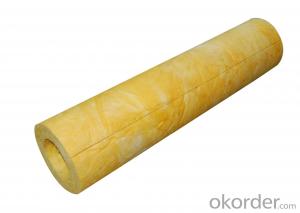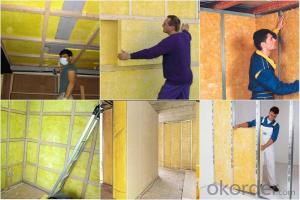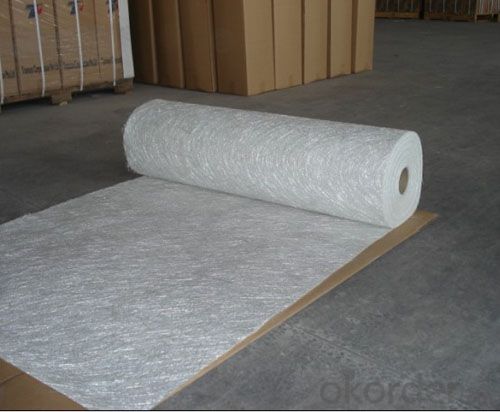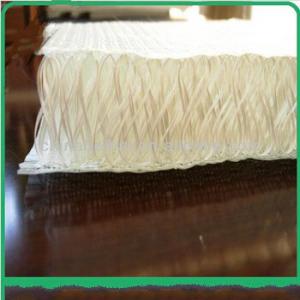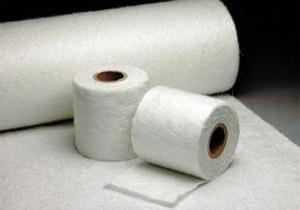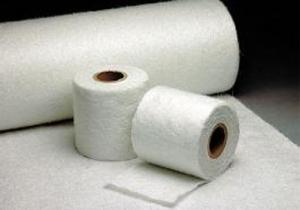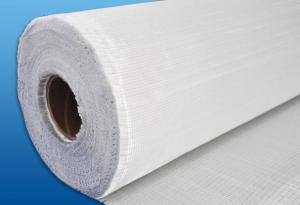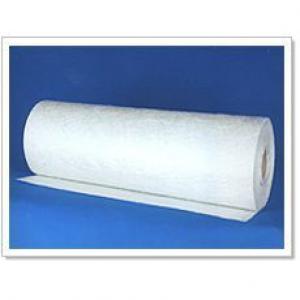Fiberglass Mat Tissue Sandwich Fabric Complex Mat 880g 200~2600 mm
OKorder Service Pledge
OKorder Financial Service
You Might Also Like
Description & application | |||||||||||||||||||||||||||||||||||||||||||||
This mat is the multi-layered combination mat, generally made by mechanically stitching layers of roving or woven roving or chopped strand, in this case to one or both sides of synthetic fiber core (PP or PET), like a sandwich. The complex mat generally also be made from a combination of woven roving which are mechanically stitched with mats made of chopped strand to form the “bread”. Some complex mat even have no roving or fabric (i.e. complexes stitched from mats and veils without fabric layers). In all cases, the layers are mechanically stitched to the synthetic fiber core. It is mainly applied in the hand lay up, RTM and other close molding processes.
Product Features | |||||||||||||||||||||||||||||||||||||||||||||
◎ The structure of sandwich to increase strength, reduce product weight and better surface finish. | |||||||||||||||||||||||||||||||||||||||||||||
| |||||||||||||||||||||||||||||||||||||||||||||
| |||||||||||||||||||||||||||||||||||||||||||||
FAQ Packaging: | |||||||||||||||||||||||||||||||||||||||||||||
- Q: Is fiberglass mat tissue suitable for architectural applications?
- Fiberglass mat tissue is indeed appropriate for architectural purposes. It is a lightweight and adaptable material frequently employed in construction and architectural undertakings. Its exceptional strength and durability make it well-suited for a variety of architectural applications, including wall cladding, roofing, insulation, and decorative panels. Moreover, fiberglass mat tissue possesses resistance to water, chemicals, and fire, further augmenting its appropriateness for architectural utilization. Given its versatility, it can be easily molded into diverse shapes and sizes, granting architects significant design flexibility. In conclusion, fiberglass mat tissue is a dependable and efficient material that can be effectively employed in architectural applications.
- Q: Is fiberglass mat tissue suitable for aerospace interiors?
- Yes, fiberglass mat tissue is suitable for aerospace interiors. Fiberglass mat tissue is a lightweight and highly versatile material that offers excellent strength and durability. It is commonly used in aerospace applications due to its ability to meet stringent fire safety requirements, such as low smoke and toxicity emissions. Additionally, fiberglass mat tissue is resistant to moisture, chemicals, and temperature variations, making it an ideal choice for the demanding conditions inside an aircraft cabin. Its excellent sound insulation properties further enhance its suitability for aerospace interiors, ensuring a comfortable and quiet environment for passengers. Overall, fiberglass mat tissue offers a reliable and efficient solution for aerospace interior applications.
- Q: Can fiberglass mat tissue be used for insulation in cryogenic applications?
- Yes, fiberglass mat tissue can be used for insulation in cryogenic applications. Fiberglass is a versatile material known for its excellent thermal insulation properties. It has a low thermal conductivity, which means it is highly effective at reducing heat transfer. This makes it suitable for cryogenic applications where maintaining extremely low temperatures is crucial. Additionally, fiberglass is non-combustible and does not absorb moisture, making it ideal for cryogenic environments. It can be used as a layer of insulation in cryogenic storage tanks, pipes, and other equipment to prevent heat transfer and maintain the desired low temperatures.
- Q: Is fiberglass mat tissue suitable for high-temperature applications?
- No, fiberglass mat tissue is not suitable for high-temperature applications.
- Q: Can fiberglass mat tissue be used for insulating radiant floors?
- Yes, fiberglass mat tissue can be used for insulating radiant floors. Fiberglass is a popular insulation material due to its excellent thermal properties and resistance to moisture. Fiberglass mat tissue, in particular, is designed to provide additional strength and durability to the insulation layer. When used in radiant floor systems, it helps to prevent heat loss and improve energy efficiency by creating a barrier between the heated floor and the cooler ground or subfloor. Additionally, fiberglass mat tissue is easy to install and can be cut to fit any shape or size, making it a versatile choice for insulating radiant floors.
- Q: Is fiberglass mat tissue suitable for electrical insulation applications?
- Yes, fiberglass mat tissue is suitable for electrical insulation applications. Fiberglass mat tissue is made from glass fibers that are bonded together with a resin, creating a strong and durable material. It has excellent electrical insulation properties, such as high dielectric strength and low electrical conductivity. This makes it ideal for applications where electrical insulation is required, such as in transformers, motors, and electrical switchgear. Additionally, fiberglass mat tissue is also resistant to moisture, chemicals, and heat, further enhancing its suitability for electrical insulation applications.
- Q: Is fiberglass mat tissue suitable for marine applications?
- Yes, fiberglass mat tissue is suitable for marine applications. It is a commonly used material in the marine industry due to its durability, strength, and resistance to water and corrosion. Fiberglass mat tissue is lightweight, making it ideal for boat construction and repairs. It is also highly resistant to UV rays, chemicals, and harsh weather conditions, which are common in marine environments. Moreover, it provides excellent structural reinforcement and can be easily shaped and molded to fit various marine components. Overall, fiberglass mat tissue is a reliable and versatile material for marine applications.
- Q: Is fiberglass mat tissue suitable for insulation in food processing facilities?
- Fiberglass mat tissue is not a suitable choice for insulation in food processing facilities due to its intended use as a reinforcement in composites, such as roofing and construction materials, rather than meeting the specific requirements of food processing environments. In order to ensure the safety and compliance of food processing facilities, it is necessary to use insulation materials that are safe, durable, and in accordance with strict health and safety regulations. Fiberglass mat tissue lacks these essential characteristics and may potentially endanger food safety. To address this issue, it is recommended to utilize insulation materials that are specifically designed for food processing facilities. These materials should be non-toxic, resistant to moisture, mold, and bacteria, and capable of withstanding high temperatures and frequent cleaning and sanitization procedures. Some examples of appropriate insulation materials for food processing facilities include closed-cell foam, mineral wool, and polyisocyanurate (PIR) foam. These materials have undergone extensive testing and have been proven to meet the necessary standards and regulations for use in food processing environments. Given the importance of prioritizing the safety and hygiene of food processing facilities, it is advisable to seek guidance from experts or insulation specialists who possess the knowledge and expertise to recommend the most suitable and compliant insulation options for these facilities.
- Q: Can fiberglass mat tissue be used for reinforcing wind turbine blades?
- Yes, fiberglass mat tissue can be used for reinforcing wind turbine blades. It is commonly utilized in the manufacturing process as it provides strength, durability, and flexibility to the blades, making them more capable of withstanding the forces and stresses experienced during operation.
- Q: Can fiberglass mat tissue be used for reinforcement in composites?
- Yes, fiberglass mat tissue can be used for reinforcement in composites. It is commonly used as a reinforcement material in various composite applications due to its high strength, durability, and excellent bonding properties. The fiberglass mat tissue helps enhance the mechanical properties and structural integrity of the composite material.
Send your message to us
Fiberglass Mat Tissue Sandwich Fabric Complex Mat 880g 200~2600 mm
OKorder Service Pledge
OKorder Financial Service
Similar products
Hot products
Hot Searches
Related keywords










